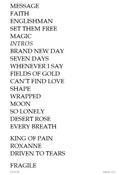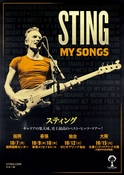
I was blown away by Sting's continued vigour at the Makuhari Messe concert. It was an all-time best performance, but it felt more fresh and exciting than nostalgic!
I attended the opening night of Sting's Japan tour, his first in about two years, which kicked off in Fukuoka. As previously announced, this tour is a lavish all-time best tour, covering everything from The Police to his solo career. However, rather than simply "recreating" nostalgic hits, this greatest hits show was a kind of "rebirth," modernizing each song with elaborate design. It all stemmed from his new album, "My Songs," a self-cover album of new interpretations.
For example, the opening track, "Message in a Bottle," features Kevon Webster's jazzy keyboards, while "Englishman in New York" effectively incorporates a lustrous choir, enhancing the song's depth with an arrangement that brings a startling freshness to these classic Sting songs. Sting, who appeared dashingly with his bass, was in top form both as a player and a singer, and the bass riff in "If I Ever Lose My Faith in You" was simply amazing! It was also in keeping with his mode since his return to rock & roll with "57th Street, 9th Avenue." The first five songs, including "Every Little Thing She Does Is Magic," were truly signature hits, and the nonstop performance made for a truly luxurious opening.
The middle section, following introductions, featured a variety of sections, focusing on each band member. Harmonica player Shane Sager takes on Stevie Wonder's parts on "Brand New Day," while chorus member Melissa Musik takes on Blige's parts on the Mary J. Blige collaboration "Whenever I Say Your Name," creating a mellow duet. "Seven Days," with its flowing, graceful form, accelerates and decelerates repeatedly, featuring the polyrhythms of father-son guitarists Dominic and Rufus Miller, is far more avant-garde than the first half. And on "If You Can't Find Love," taken from the much-talked-about reggae collaboration album with Shaggy, "44/876," chorus members Melissa and Gene Noble, who also participated on that album, take centre stage. Sting takes command as band leader in this middle section, which could be said to further emphasize his reggae and jazz influences. I was blown away by Sting's continued vigour at the Makuhari Messe concert. Despite being his all-time best, this incredible live performance evoked fresh excitement rather than nostalgia!
Then, as the show entered its second half, Josh Freese's drumming finally exploded during "Walking On The Moon" and "So Lonely," creating the ultimate showpiece. His dynamic playing style, driven entirely by his entire body, is quite different from that of Stewart Copeland, who (seems to) effortlessly executes a staggering number of moves without a single facial expression. That's why "So Lonely," coupled with Sting's repeated, ragga-like shouts of "Lonely, Lonely...," sounded far more muscular and tough than the original. The contrast between the two was also stunning, as the performance transitioned into "Desert Rose," featuring a complex band ensemble reminiscent of an Arabian labyrinth, complete with heavy synths.
Even at 68 years old this year, Sting's youthfulness is extraordinary. Even after munching down a bowl of ramen, his toned body remains perfectly toned, truly star-like! While "Desert Rose" and "Fragile" showcase the depth of his voice, honed over a career spanning nearly 45 years, "Roxanne" still boasts the same high-pitched vocals he sang in his 20s with a vibrant, lush voice that shows no signs of fading. The performance, with its brisk pace and lack of pretentious pauses or flashbacks, focused solely on the power of music, without flashy visuals or special effects, condensed the rich experience of the day. It was the beauty of Sting's body, voice, and spirit, stripped away from the unnecessary and focused on the essence of his expression. (Shino Kogawa)
(c) rockinon.com



